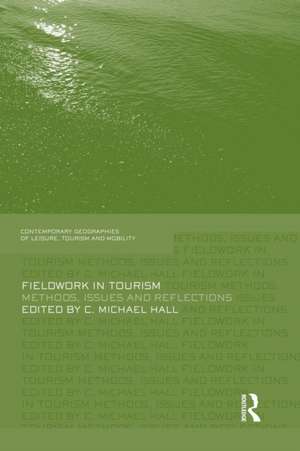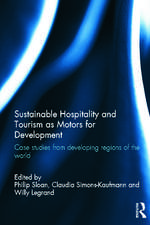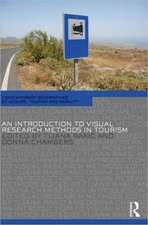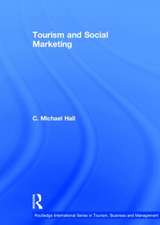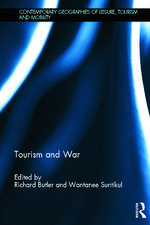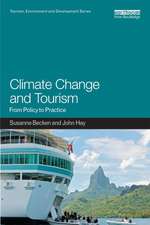Fieldwork in Tourism: Methods, Issues and Reflections: Contemporary Geographies of Leisure, Tourism and Mobility
Editat de Michael C. Hallen Limba Engleză Paperback – 27 apr 2015
Fieldwork in Tourism is the first book to focus on this extremely significant component of contemporary tourist research and provides hands on approaches to conducting tourism fieldwork in a range of settings, exploring the methodological considerations and offering strategies to mitigate these. The book also discusses how fieldwork affects researchers personally and what happens to field relationships. Divided into five sections, each with an introduction and a guide to further reading, the chapters cover the context of fieldwork, research relationships, politics and power, the position of the researcher in the field, research methods and processes, including virtual fieldwork, and the relationships between being a tourist and doing fieldwork. The concluding chapter suggests that the link between tourism and fieldwork perhaps offers greater insights into understanding creative fieldwork than may be imagined.
This book incorporates a rich and diverse set of fieldwork experiences, insights and reflections on conducting fieldwork in different settings, the problems that emerge, the solutions that were developed, and the realities of being ‘in the field’. Fieldwork in Tourism is an essential guide for Tourism higher level students, academics and researchers embarking on research in this field.
| Toate formatele și edițiile | Preț | Express |
|---|---|---|
| Paperback (1) | 490.25 lei 43-57 zile | |
| Taylor & Francis – 27 apr 2015 | 490.25 lei 43-57 zile | |
| Hardback (1) | 1229.46 lei 43-57 zile | |
| Taylor & Francis – 8 sep 2010 | 1229.46 lei 43-57 zile |
Din seria Contemporary Geographies of Leisure, Tourism and Mobility
-
 Preț: 311.41 lei
Preț: 311.41 lei -
 Preț: 311.41 lei
Preț: 311.41 lei -
 Preț: 311.41 lei
Preț: 311.41 lei -
 Preț: 326.49 lei
Preț: 326.49 lei -
 Preț: 325.97 lei
Preț: 325.97 lei -
 Preț: 324.71 lei
Preț: 324.71 lei -
 Preț: 311.51 lei
Preț: 311.51 lei -
 Preț: 296.80 lei
Preț: 296.80 lei -
 Preț: 310.65 lei
Preț: 310.65 lei -
 Preț: 233.53 lei
Preț: 233.53 lei -
 Preț: 356.63 lei
Preț: 356.63 lei -
 Preț: 355.44 lei
Preț: 355.44 lei - 18%
 Preț: 1057.89 lei
Preț: 1057.89 lei - 18%
 Preț: 1057.40 lei
Preț: 1057.40 lei - 30%
 Preț: 850.91 lei
Preț: 850.91 lei - 18%
 Preț: 1165.73 lei
Preț: 1165.73 lei - 18%
 Preț: 1379.90 lei
Preț: 1379.90 lei - 18%
 Preț: 710.40 lei
Preț: 710.40 lei - 18%
 Preț: 1058.69 lei
Preț: 1058.69 lei - 18%
 Preț: 1222.85 lei
Preț: 1222.85 lei - 18%
 Preț: 1056.00 lei
Preț: 1056.00 lei - 18%
 Preț: 1220.63 lei
Preț: 1220.63 lei - 18%
 Preț: 1115.21 lei
Preț: 1115.21 lei - 18%
 Preț: 1056.00 lei
Preț: 1056.00 lei - 26%
 Preț: 765.43 lei
Preț: 765.43 lei - 18%
 Preț: 1055.51 lei
Preț: 1055.51 lei -
 Preț: 415.67 lei
Preț: 415.67 lei - 18%
 Preț: 1051.10 lei
Preț: 1051.10 lei -
 Preț: 416.26 lei
Preț: 416.26 lei - 18%
 Preț: 1223.21 lei
Preț: 1223.21 lei -
 Preț: 396.46 lei
Preț: 396.46 lei - 18%
 Preț: 1117.07 lei
Preț: 1117.07 lei - 18%
 Preț: 1056.35 lei
Preț: 1056.35 lei - 18%
 Preț: 1127.34 lei
Preț: 1127.34 lei - 18%
 Preț: 1062.62 lei
Preț: 1062.62 lei - 26%
 Preț: 822.54 lei
Preț: 822.54 lei - 18%
 Preț: 1119.16 lei
Preț: 1119.16 lei - 18%
 Preț: 1060.74 lei
Preț: 1060.74 lei - 26%
 Preț: 990.17 lei
Preț: 990.17 lei - 28%
 Preț: 848.98 lei
Preț: 848.98 lei - 18%
 Preț: 1336.32 lei
Preț: 1336.32 lei -
 Preț: 488.33 lei
Preț: 488.33 lei - 18%
 Preț: 1395.61 lei
Preț: 1395.61 lei - 26%
 Preț: 822.54 lei
Preț: 822.54 lei - 18%
 Preț: 1066.09 lei
Preț: 1066.09 lei
Preț: 490.25 lei
Nou
Puncte Express: 735
Preț estimativ în valută:
93.81€ • 98.19$ • 78.08£
93.81€ • 98.19$ • 78.08£
Carte tipărită la comandă
Livrare economică 31 martie-14 aprilie
Preluare comenzi: 021 569.72.76
Specificații
ISBN-13: 9781138883574
ISBN-10: 1138883573
Pagini: 336
Ilustrații: 1 black & white illustrations, 11 black & white tables, 1 black & white line drawings
Dimensiuni: 156 x 234 x 18 mm
Greutate: 0.48 kg
Ediția:1
Editura: Taylor & Francis
Colecția Routledge
Seria Contemporary Geographies of Leisure, Tourism and Mobility
Locul publicării:Oxford, United Kingdom
ISBN-10: 1138883573
Pagini: 336
Ilustrații: 1 black & white illustrations, 11 black & white tables, 1 black & white line drawings
Dimensiuni: 156 x 234 x 18 mm
Greutate: 0.48 kg
Ediția:1
Editura: Taylor & Francis
Colecția Routledge
Seria Contemporary Geographies of Leisure, Tourism and Mobility
Locul publicării:Oxford, United Kingdom
Public țintă
PostgraduateCuprins
Introducing the Contexts of Fieldwork 1. Fieldwork in Tourism/Touring Research: Where Does Tourism End and Fieldwork Begin? 2. Defining and Redefining Conceptual Frameworks for Social Science Field Research Research Relationships: Power, Politics and Patron-client Affinities 3. Researching the Political in Tourism: Where Knowledge Meets Power 4. The Visible/Invisible Researcher: Ethics and Politically-Sensitive Research 5. Interviewing Elites: Perspectives from the Medical Tourism Sector in India and Thailand Positionality: Researcher Position in the Field, Practicalities, Perils, and Pitfalls 6. Reflexivity and Ethnography in Community Tourism Research 7. Doing ‘Risky’ and ‘Sexy’ Research: Reframing the Concept of ‘Relational’ in Qualitative Research 8. Studying Halal Restaurants in New Zealand: Experiences and Perspectives of a Muslim Female Researcher 9. Researching Heritage Tourism in Singapore: An Outsider Perspective as an Asset? 10. Cosmopolitan Methodologies: Implications of the Ethnographer’s Multiple Positions in Studying Tourism 11. Allowing Women’s Voices to be Heard in Tourism Research: Competing Paradigms of Method Methods and Processes 12. Studying Local-to-Global Tourism Dynamics Through Glocal Ethnography 13. Researching Second Home Tourism in South Africa: Methodological Challenges and Innovations 14. Off the Record: Segmenting Informal Discussions into Viable Methodological Categories 15. Know Yourself: Making the Visual Work in Tourism Research 16. Work it Out: Using Work as Participant Observation to Study Tourism 17. Researching Tourists in the Outdoors – Challenges and Experiences from Protected Areas in Sweden 18. Challenges in Fieldwork Researching Group Service Experiences at a White Water Rafting Provider in New Zealand 19. On Facing Rejection: Volunteer Tourists that I Could Not Interview Future Directions and New Environments 20. In Cyberspace Can Anybody Hear You Scream? Issues in the Conduct of Online Fieldwork 21. Integrating Researchers and Indigenous Communities: Reflections From Northern Canada 22. Managing Post-Fieldwork Interpersonal Relationships: Mea (Maxima?) Culpa 23. Concluding Thoughts: Where Does Fieldwork End and Tourism Begin?
Descriere
The inherent mobility of tourists and consequent relative ephemerality of contact between the visitor and the visited tourism phenomenon have specific characteristics that challenge the usual fieldwork practices of the social and physical sciences. Such conditions create specific concerns for the tourism researcher in terms of their positionality, relationality, accessibility, ethics, reflexivity, and methodological appropriateness.
Fieldwork in Tourism is the first book to focus on this extremely significant component of contemporary tourist research and provides hands on approaches to conducting tourism fieldwork in a range of settings, exploring the methodological considerations and offering strategies to mitigate these. The book also discusses how fieldwork affects researchers personally and what happens to field relationships. Divided into five sections, each with an introduction and a guide to further reading, the chapters cover the context of fieldwork, research relationships, politics and power, the position of the researcher in the field, research methods and processes, including virtual fieldwork, and the relationships between being a tourist and doing fieldwork. The concluding chapter suggests that the link between tourism and fieldwork perhaps offers greater insights into understanding creative fieldwork than may be imagined.
This book incorporates a rich and diverse set of fieldwork experiences, insights and reflections on conducting fieldwork in different settings, the problems that emerge, the solutions that were developed, and the realities of being ‘in the field’. Fieldwork in Tourism is an essential guide for Tourism higher level students, academics and researchers embarking on research in this field.
Fieldwork in Tourism is the first book to focus on this extremely significant component of contemporary tourist research and provides hands on approaches to conducting tourism fieldwork in a range of settings, exploring the methodological considerations and offering strategies to mitigate these. The book also discusses how fieldwork affects researchers personally and what happens to field relationships. Divided into five sections, each with an introduction and a guide to further reading, the chapters cover the context of fieldwork, research relationships, politics and power, the position of the researcher in the field, research methods and processes, including virtual fieldwork, and the relationships between being a tourist and doing fieldwork. The concluding chapter suggests that the link between tourism and fieldwork perhaps offers greater insights into understanding creative fieldwork than may be imagined.
This book incorporates a rich and diverse set of fieldwork experiences, insights and reflections on conducting fieldwork in different settings, the problems that emerge, the solutions that were developed, and the realities of being ‘in the field’. Fieldwork in Tourism is an essential guide for Tourism higher level students, academics and researchers embarking on research in this field.
